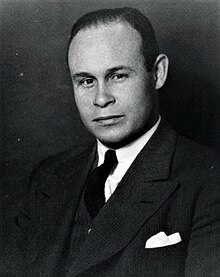Charles Richard Drew | |
|---|---|
 Charles Richard Drew | |
| Born | June 3, 1904 Washington, D.C., U.S. |
| Died | April 1, 1950 (aged 45) |
| Alma mater | Amherst College McGill University Columbia University |
| Known for | Blood banking, blood transfusions |
| Awards | Spingarn Medal |
| Scientific career | |
| Fields | General surgery |
| Institutions | Freedman's Hospital Morgan State University Montreal General Hospital Howard University |
| Doctoral advisor | John Beattie |
Charles Richard Drew (June 3, 1904 – April 1, 1950) was an American surgeon and medical researcher. He researched in the field of blood transfusions, developing improved techniques for blood storage, and applied his expert knowledge to developing large-scale blood banks early in World War II. This allowed medics to save thousands of Allied forces' lives during the war.[1] As the most prominent African American in the field, Drew protested against the practice of racial segregation in the donation of blood, as it lacked scientific foundation, and resigned his position with the American Red Cross, which maintained the policy until 1950.[2]
- ^ "Patent For Preserving Blood Issued November 10, 1942; Washingtonian's invention made blood bank possible" (Press release). Brigid Quinn, United States Patent and Trademark Office. November 9, 2001. Archived from the original on February 11, 2009. Retrieved February 3, 2009.
- ^ Inventions, Mary Bellis Inventions Expert Mary Bellis covered; films, inventors for ThoughtCo for 18 years She is known for her independent; documentaries; Alex, including one about; Bellis, er Graham Bell our editorial process Mary. "All About the Inventor of the Blood Bank". ThoughtCo. Retrieved 2021-05-06.